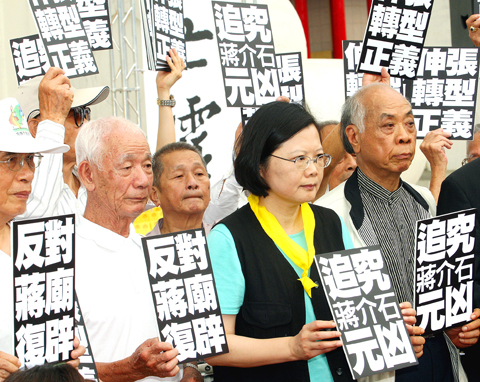Democratic Progressive Party (DPP) Chairperson Tsai Ing-wen (蔡英文) accused President Ma Ying-jeou (馬英九) yesterday of insincerity in promoting reconciliation with victims of political persecution.
Ma’s paying tribute to dictator Chiang Kai-shek (蔣介石) and planning to change the name of the National Taiwan Democracy Memorial Hall back to Chiang Kai-shek Memorial Hall showed that the Ma government has never reviewed the massacre conducted by the Chinese Nationalist Party (KMT), Tsai said.
“When Ma bows and sheds tears in front of the body of the main culprit [Chiang], he rubs salt in the wounds of victims of the 228 Incident and the White Terror,” Tsai said at a ceremony to commemorate victims of the two events.

PHOTO: CNA
The ceremony, organized by the DPP, took place at the main entrance of the National Taiwan Democracy Memorial Hall under the Liberty Square archway.
The former DPP government renamed the memorial in 2007 as part of its efforts to remove symbols commemorating Chiang. The DPP also replaced the inscription on the hall’s entry arch, dazhong zhizheng (大中至正), meaning Chiang’s “great neutrality and perfect uprightness,” to “Liberty Square” (自由廣場) and redecorated the hall.
“Although the Ma government has proposed reinstating the title of Chiang Kai-shek Memorial Hall, it has never reviewed or apologized for the KMT’s violence,” Tsai said.
The KMT respects Chiang, while the Chinese Communist Party (CCP) venerates Mao Zedong (毛澤東) and both parties do everything they can to avoid facing the massacres they committed, she said.
Now that the KMT and CCP have reconciled, both are cooperating to legitimize their rule and rationalize their massacres, she said.
While the KMT government held a ceremony to commemorate victims of the White Terror yesterday, it was not sincere in holding the event, she said.
DPP Legislator Wang Sing-nan (王幸男) said copies of military court rulings in Chiang’s handwriting showed Chiang often changed lighter sentences to heavier sentences and heavier sentences to the death penalty.
The 228 Incident was a rebellion against KMT rule sparked on Feb. 27, 1947. It has been estimated that some 20,000 people were killed by KMT troops in the months following the rebellion.
As Chiang dispatched KMT troops to Taiwan, many believe he should bear the largest share of responsibility for the tragedy.
The White Terror began soon after the 228 Incident, when the government launched a brutal military crackdown against locals protesting the administration of executive administrator Chen Yi (陳儀), who was appointed by the KMT government to govern Taiwan after World War II. Martial law was enacted briefly at that time.
In the following years, tens of thousands of people were arrested, imprisoned, tortured and murdered.
During the White Terror era, the KMT government killed tens of thousands of suspected dissidents, mainly the Taiwanese intellectual and social elite, as it searched for communist agents, sympathizers and others it feared could pose a threat to its rule.
The powerful Taiwan Garrison Command identified suspects through its widespread secret-agent system.
Also See: REMEMBERING THE WHITE TERROR: Ma promises to increase efforts for compensation
Also See: REMEMBERING THE WHITE TERROR: Prisoner shares violin tale
Also See: REMEMBERING THE WHITE TERROR: Researcher says Chiangs should be held responsible

The CIA has a message for Chinese government officials worried about their place in Chinese President Xi Jinping’s (習近平) government: Come work with us. The agency released two Mandarin-language videos on social media on Thursday inviting disgruntled officials to contact the CIA. The recruitment videos posted on YouTube and X racked up more than 5 million views combined in their first day. The outreach comes as CIA Director John Ratcliffe has vowed to boost the agency’s use of intelligence from human sources and its focus on China, which has recently targeted US officials with its own espionage operations. The videos are “aimed at

STEADFAST FRIEND: The bills encourage increased Taiwan-US engagement and address China’s distortion of UN Resolution 2758 to isolate Taiwan internationally The Presidential Office yesterday thanked the US House of Representatives for unanimously passing two Taiwan-related bills highlighting its solid support for Taiwan’s democracy and global participation, and for deepening bilateral relations. One of the bills, the Taiwan Assurance Implementation Act, requires the US Department of State to periodically review its guidelines for engagement with Taiwan, and report to the US Congress on the guidelines and plans to lift self-imposed limitations on US-Taiwan engagement. The other bill is the Taiwan International Solidarity Act, which clarifies that UN Resolution 2758 does not address the issue of the representation of Taiwan or its people in

US Indo-Pacific Commander Admiral Samuel Paparo on Friday expressed concern over the rate at which China is diversifying its military exercises, the Financial Times (FT) reported on Saturday. “The rates of change on the depth and breadth of their exercises is the one non-linear effect that I’ve seen in the last year that wakes me up at night or keeps me up at night,” Paparo was quoted by FT as saying while attending the annual Sedona Forum at the McCain Institute in Arizona. Paparo also expressed concern over the speed with which China was expanding its military. While the US

SHIFT: Taiwan’s better-than-expected first-quarter GDP and signs of weakness in the US have driven global capital back to emerging markets, the central bank head said The central bank yesterday blamed market speculation for the steep rise in the local currency, and urged exporters and financial institutions to stay calm and stop panic sell-offs to avoid hurting their own profitability. The nation’s top monetary policymaker said that it would step in, if necessary, to maintain order and stability in the foreign exchange market. The remarks came as the NT dollar yesterday closed up NT$0.919 to NT$30.145 against the US dollar in Taipei trading, after rising as high as NT$29.59 in intraday trading. The local currency has surged 5.85 percent against the greenback over the past two sessions, central